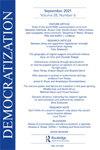Formal power in informal networks. Distribution of power resources in personalized bureaucracies: the case of Russia’s subnational elites
IF 2.9
1区 社会学
Q1 POLITICAL SCIENCE
引用次数: 0
Abstract
ABSTRACT The instrumental use of patronage for political appointments and career advancement can be found across all regime types and historical periods. Despite a pronounced academic interest in the political and economic effects of patron-client relationships, little is known about the nature of interplay between informal networks and formal hierarchies. How are formal powers distributed in personalized bureaucracies? The article addresses this question through a cross-temporal case study of subnational government in one of Russia’s regions – Sverdlovsk Oblast. Based on network analysis and negative binomial regression, the article shows that subnational leaders and their clienteles seek to monopolize those formal powers that allow administrative control over other executive agencies, while other coercive, financial, and normative powers are distributed relatively evenly. This pattern persists regardless of institutional context, degree of subnational autonomy, or the shape of informal networks, which signifies the importance of controlling functions that the core of informal networks in personalized bureaucracies performs.非正式网络中的正式权力。权力资源在个人化官僚机构中的分配:以俄罗斯地方精英为例
本文章由计算机程序翻译,如有差异,请以英文原文为准。
求助全文
约1分钟内获得全文
求助全文
来源期刊

Democratization
POLITICAL SCIENCE-
CiteScore
6.40
自引率
12.50%
发文量
73
期刊介绍:
Democratization aims to promote a better understanding of democratization - defined as the way democratic norms, institutions and practices evolve and are disseminated both within and across national and cultural boundaries. While the focus is on democratization viewed as a process, the journal also builds on the enduring interest in democracy itself and its analysis. The emphasis is contemporary and the approach comparative, with the publication of scholarly contributions about those areas where democratization is currently attracting considerable attention world-wide.
 求助内容:
求助内容: 应助结果提醒方式:
应助结果提醒方式:


